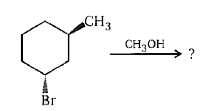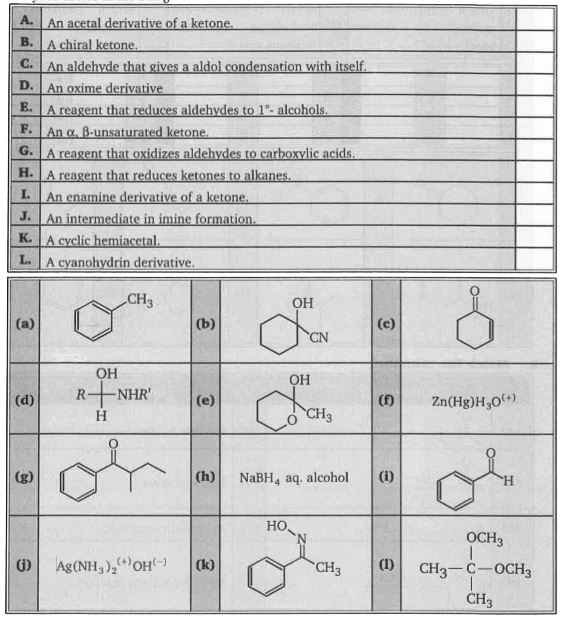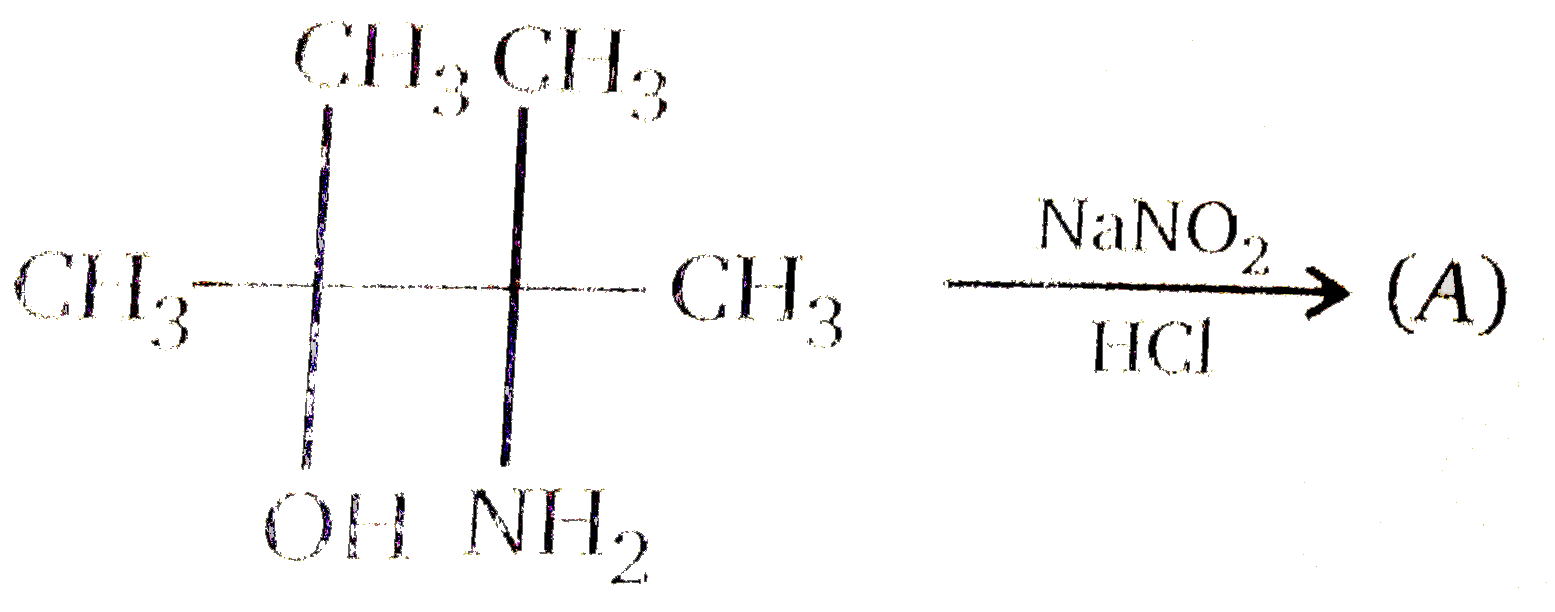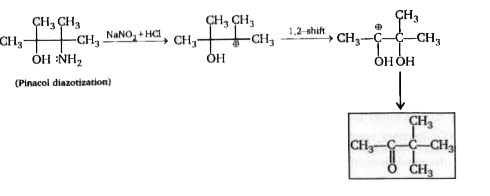Di-tert-glycols rearrange in the presence of acid to give alpa-tertiary ketones. The trivial name of the simplest glycol of this type is pinacol, and this type of reaction therefore is named pinacol rearrangement (in this specific case, the reaction is called a pinacol-pinacolone rearrangement). The rearrangement involves 4 steps. one of the hydroxyl groups is protonated in the first step. A molecule of water is eliminated in the second step and a tertiary carbocation is formed. The carbocation rearranges in the third step into a more stable carboxonium ion via a [1,2] rearrangement. In the last step, the carboxonium ion is deprotonated and the product ketone is obtained.
![Di-tert-glycols rearrange in the presence of acid to give alpa-tertiary ketones. The trivial name of the simplest glycol of this type is pinacol, and this type of reaction therefore is named pinacol rearrangement (in this specific case, the reaction is called a pinacol-pinacolone rearrangement). The rearrangement involves 4 steps. one of the hydroxyl groups is protonated in the first step. A molecule of water is eliminated in the second step and a tertiary carbocation is formed. The carbocation rearranges in the third step into a more stable carboxonium ion via a [1,2] rearrangement. In the last step, the carboxonium ion is deprotonated and the product ketone is obtained.](https://d10lpgp6xz60nq.cloudfront.net/physics_images/BLJ_MSC_ORG_CHE_JEE_C06_E02_024_Q01.png)
 Solution in Telugu
Solution in Telugu
CH3−O∣∣C−CH3∣C∣CH3−CH3


None of these
The correct Answer is:A, D
Topper's Solved these Questions
- ALCOHOL,ETHERS AND EPOXIDESBOOK - MS CHOUHANCHAPTER - ALCOHOL,ETHERS AND EPOXIDESEXERCISE - SUBJECTIVE PROBLEMS
1 Videos
- ALCOHOL,ETHERS AND EPOXIDESBOOK - MS CHOUHANCHAPTER - ALCOHOL,ETHERS AND EPOXIDESEXERCISE - SUBJECTIVE PROBLEMS
1 Videos
- 5C ALKYL HALIDES BOOK - MS CHOUHANCHAPTER - 5C ALKYL HALIDES EXERCISE - LEVEL-2 (SUBJECTIVE PROBLEMS)
1 Videos
- ALDEHYDES AND KETONESBOOK - MS CHOUHANCHAPTER - ALDEHYDES AND KETONESEXERCISE - LEVEL-2
20 Videos
Similar Questions

Maximum number of moles of Ac2O consumed by reactant (A) is :
View Solution
Maximum number of moles of Ac2O consumed by reactant (A) is :
View Solution
X = Total number of substitution and elimination product(s). Find the value of X.
View SolutionSelect the best choice for example (A to L) from the examples (a to n) given below. Write your choice in the box given.


View SolutionPINACOL PINACOLONE REARRANGEMENT'
View SolutionPinacol Pinacolone Rearrangement Migratory Aptitude
View SolutionPINACOL-PINACOLONE REARRANGEMENT.
View SolutionDi-tert-glycols rearrange in the presence of acid to give α-trtiary ketones. The trivial name of the simplest glycol of this type is pinacol, and this type of reaction therefore is named pinacol rearrangement (in this specific case, the reaction is called a pinacol-pinacolone rearrangement). The rearrangement involves 4 steps. one of the hydroxyl group is protonated in the first step. A molecule of water is eliminated in the second step and a tertiary carbocation is formed. the carbocation rearranges in the third step into a more stable carboxonium ion via a [1, 2] rearrangement. In the last step, the carboxonium ion is deprotonated and the product ketone is obtained.

What is R.D.S. of pinacol-pinacolone rearrangement ?
View SolutionDi-tert-glycols rearrange in the presence of acid to give α-trtiary ketones. The trivial name of the simplest glycol of this type is pinacol, and this type of reaction therefore is named pinacol rearrangement (in this specific case, the reaction is called a pinacol-pinacolone rearrangement). The rearrangement involves 4 steps. one of the hydroxyl group is protonated in the first step. A molecule of water is eliminated in the second step and a tertiary carbocation is formed. the carbocation rearranges in the third step into a more stable carboxonium ion via a [1, 2] rearrangement. In the last step, the carboxonium ion is deprotonated and the product ketone is obtained.


How many products obtained in above reaction ?
View SolutionDi-tert-glycols rearrange in the presence of acid to give α-trtiary ketones. The trivial name of the simplest glycol of this type is pinacol, and this type of reaction therefore is named pinacol rearrangement (in this specific case, the reaction is called a pinacol-pinacolone rearrangement). The rearrangement involves 4 steps. one of the hydroxyl group is protonated in the first step. A molecule of water is eliminated in the second step and a tertiary carbocation is formed. the carbocation rearranges in the third step into a more stable carboxonium ion via a [1, 2] rearrangement. In the last step, the carboxonium ion is deprotonated and the product ketone is obtained.


Product 'P' is :
View SolutionDi-tert-glycols rearrange in the presence of acid to give α-trtiary ketones. The trivial name of the simplest glycol of this type is pinacol, and this type of reaction therefore is named pinacol rearrangement (in this specific case, the reaction is called a pinacol-pinacolone rearrangement). The rearrangement involves 4 steps. one of the hydroxyl group is protonated in the first step. A molecule of water is eliminated in the second step and a tertiary carbocation is formed. the carbocation rearranges in the third step into a more stable carboxonium ion via a [1, 2] rearrangement. In the last step, the carboxonium ion is deprotonated and the product ketone is obtained.


Product (A) is :
View SolutionIn Pinacol-pinacolone rearrangement the reactive species undergoing rearrangement is
View SolutionPinacol- Pinacolone Rearrangement || Demjanov-Rearrangement
View SolutionE1 Reaction (Acid Catalyzed Dehydration OF Alcohol) ||Pinacol Pinacolone Rearrangement
View SolutionPinacol Rearrangement #!#Demjanov Rearrangement
View SolutionPinacol-Pinacolone Rearrangement
View Solution

